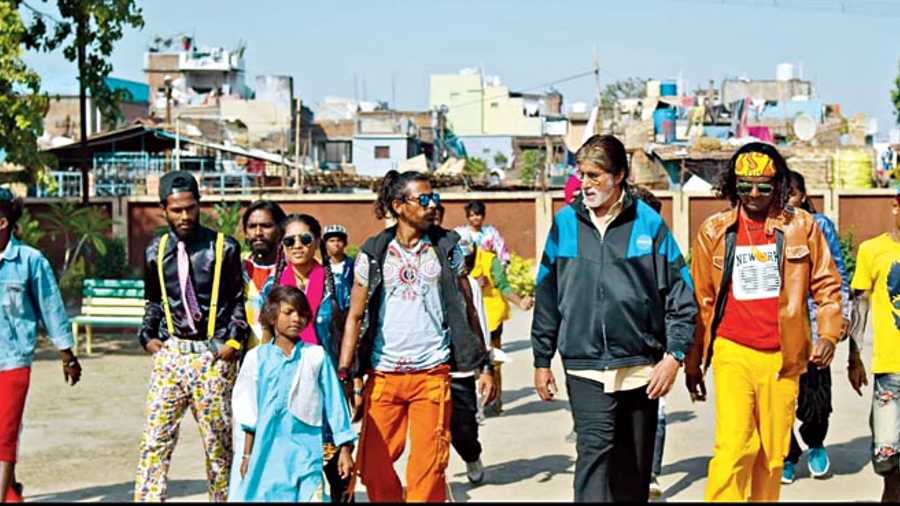His name is Vijay. But he’s not angry and neither is he young. His job, that soon becomes the focus of his life, is to tame a group of wayward youngsters and channelise their anger and energy into something worthwhile.
Amitabh Bachchan is Vijay, the beating heart of Jhund. Meaning ‘herd’, Jhund refers to a ragtag team of slum youth in Nagpur, given to a life of gundagiri, selling drugs, committing petty crimes and ever ready to get into a street fight. Vijay observes them every day as they get into one fight after another, smoke and drink to the point of passing out and walk in and out of police lockup. The light bulb moment arrives when he sees them one day energetically, and often expertly, kicking around a broken plastic container. ‘Football’ his eyes light up to say, and he quietly, first with bribe and then with passion, draws them into playing the game.
Bachchan’s Vijay Borade, a social activist, is modelled on the real-life Vijay Barse, a now-retired sports teacher who, two decades ago, founded Slum Soccer, a Nagpur-based NGO that focuses on giving socially marginalised young people a new life by grooming them as footballers.
Director Nagraj Popatrao Manjule has, through his cinema, always strived to bring systemic oppression, caste-based politics and marginalisation to the screen. His highly acclaimed Marathi films Fandry and Sairat focused on caste-based discrimination, with Manjule tempering most of his work with his Dalit identity and the strong influence of B.R. Ambedkar.
Jhund, his debut in Hindi cinema, is no different. Cries of ‘Jai Bhim’ rend the air and there is even a celebratory song with Ambedkar’s portrait in the backdrop. The wall, both the literal one which separates the jhopad patti from the privileged world, and the metaphorical one, looms large in Jhund.
Credited with story, screenplay, dialogue and direction, Manjule takes time to build his film. The transition of the obdurate youngsters isn’t abrupt, with Borade braving naysayers, including his own son who despises his father whiling away his time and energy on what he thinks is a lost cause, to stick to his goal. It starts off with a Chak De! India-styled faceoff between the ‘jhund’ and the more ‘polished’ neighbourhood college team, moves on to the youngsters getting back into the game after a series of obstacles and ends with them rising, in mind as well as in body, to take a shot at a better future.
The sports underdog film is a premise brimming with enough plot and potential to provide material for film after film. Throw in the ever-widening chasm between the haves and the have-nots and one has a film that elicits both laughs and tears in equal measure. All the marginalised want is respect and a level playing field, the film emphasises. As Vijay says, “Jhund nahin, team kahiye.”
In a Nagraj Manjule film, you can run your fingers on the grime, you can smell the overflowing drains, you feel both hope and despair.... His films are steeped in reality, and in Jhund, the majority of the cast comprises newcomers, most of whom are not actors. They are natural and untutored, often unaware of the camera. That works in parts for the film, but also inversely translates into a certain rawness that doesn’t allow emotionally-laden moments to land as effectively as they should have. For instance, the slum gang rattling off their individual stories of poverty and discrimination as if they are reading them from a piece of paper doesn’t have any emotional heft. The soccer matches, however, especially the one in which gang jhopad patti pummel a more fancied team to pulp, are well staged.
Jhund is a butt-numbing 178 minutes long and that’s never a good thing in these times of decreasing attention spans. Repetitive scenes and one too many songs bog down the narrative and after a point, you find yourselves becoming less invested in the trials and tribulations, and subsequently, the rise and fall and rise of the underdogs.
Holding Jhund together, as expected, is Bachchan who stands tall, both literally and figuratively. The man, who will turn 80 this year, continues to remain a powerhouse, making Jhund watchable even when it isn’t as engaging. “Kuch log thak jaate hain lekin Vijay sir kabhi nahin thakte,” says a character about Borade in the film. The same can be said about the man who spins screen magic out of nowhere, each time and every time. Jai Bachchan!
Jhund (U/A)
Director: Nagraj Popatrao Manjule
Cast: Amitabh Bachchan, Akash Thosar, Rinku Rajguru
Running time: 178 minutes











